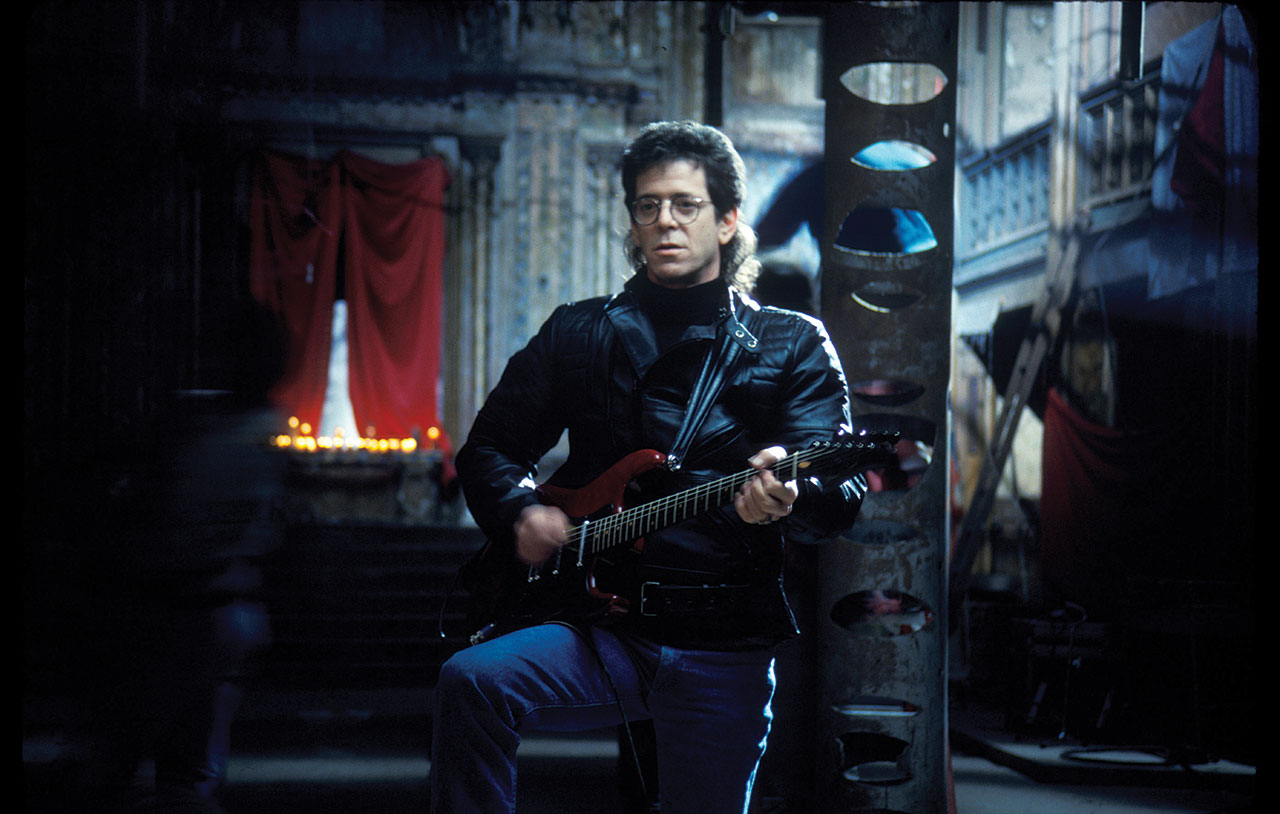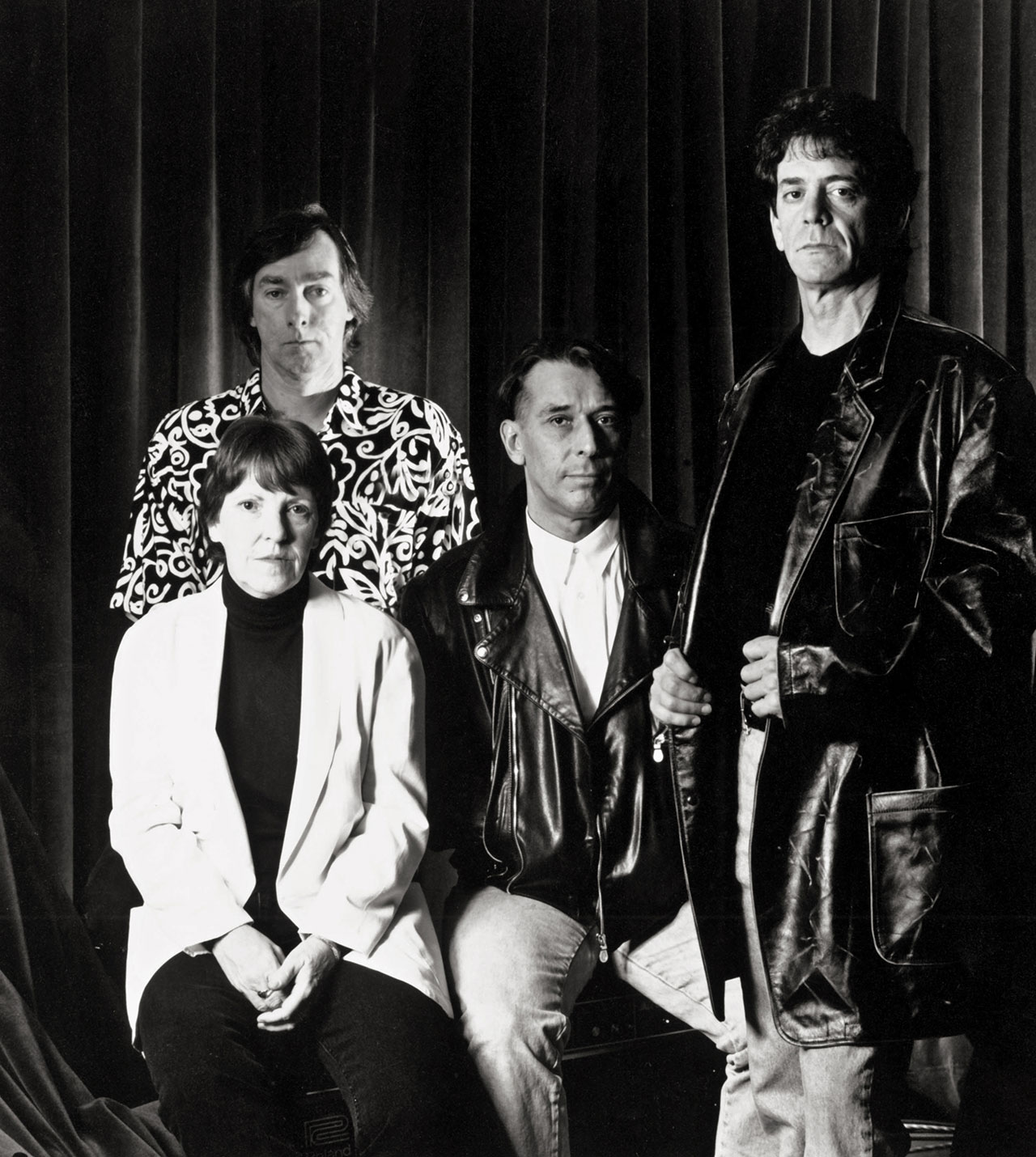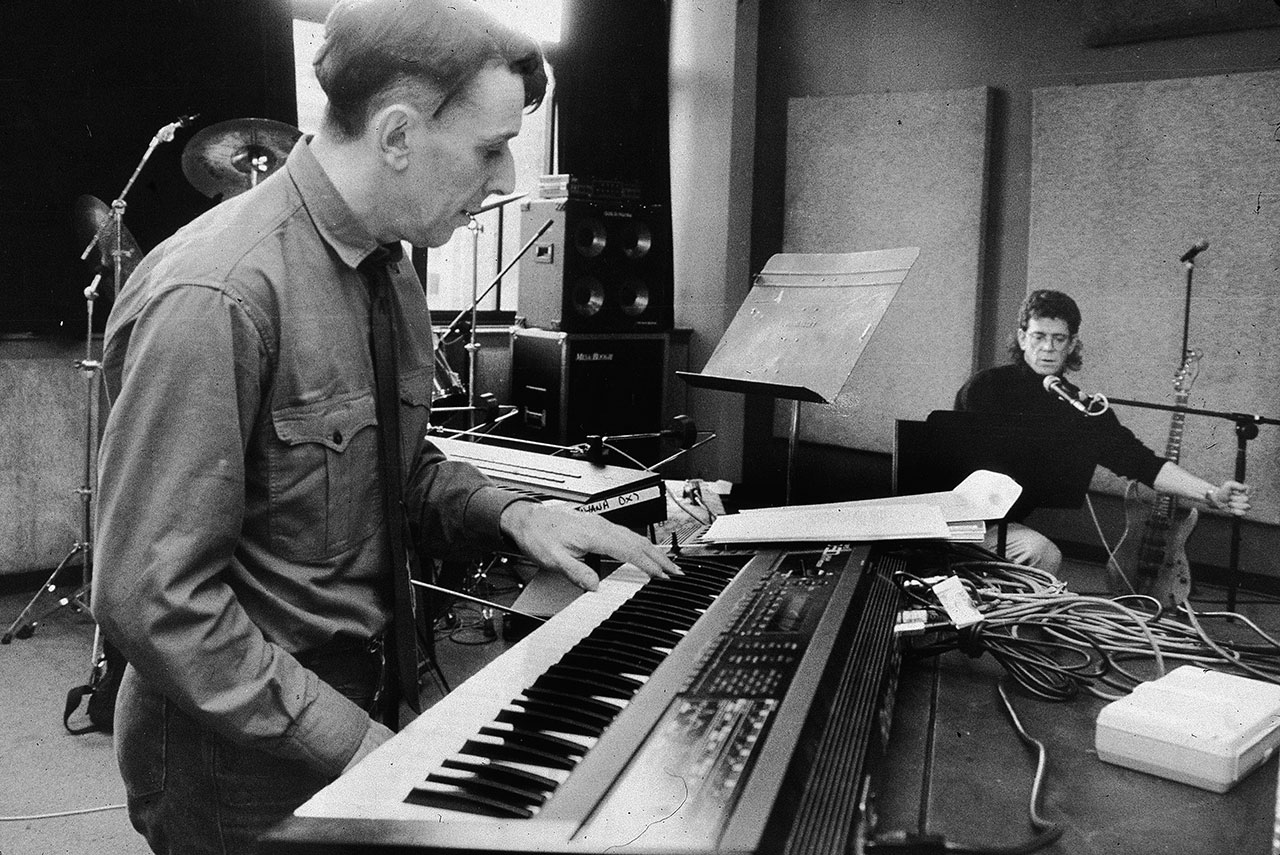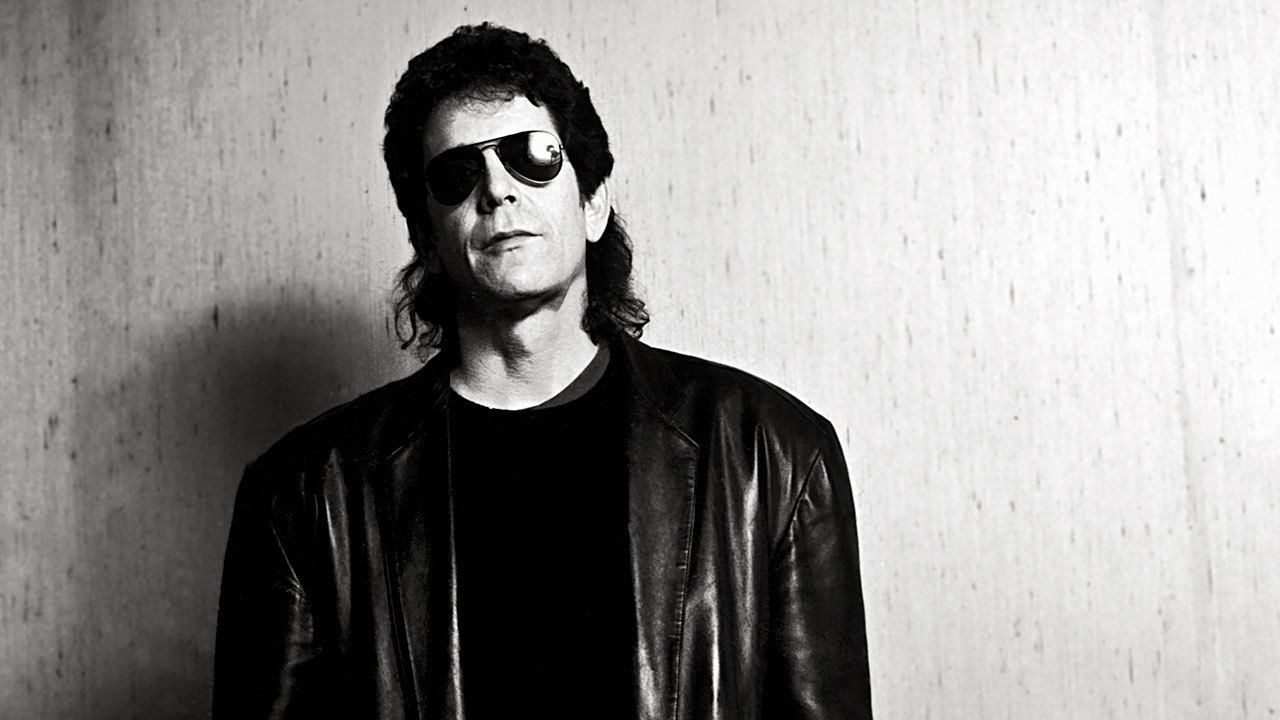Lou Reed’s New York has been voted as number 31 in our countdown of the 100 Greatest Albums Of The 1980s. Read the full article here.
Lou Reed’s 1960s expanded rock’s parameters. His work with the Velvet Underground, as fearlessly transgressive as any outsider art, toughened the nascent genre, matured its lyrical lingua franca from Brill Building baby talk to frank, unexpurgated Hubert Selby Jr grime, while cranking its carefree Green Onions grooves toward searing proto-metal aggression. His solo 70s sealed his dark reputation as street-smart rock’n’roll animal. Deadpan, dangerous, embraced by glam and punk movements alike as a reluctant prime mover, his reputation for critic-confounding artistic forward momentum was unparalleled. From Transformer to Street Hassle, here was a shark among minnows.
And then the 80s happened.
Experience tells us that decades normally take a couple of years to find their feet, to shake off the shackles of the recent past before truly revealing their quintessential characteristics. Consequently, 1982’s stripped and literate The Blue Mask sits comfortably with Reed’s best work of the previous decade. Exuberant, ecstatic, inspired, Mask captured a Reed reborn, recently married, sober and deeply enamoured of new wife and muse Sylvia Morales. It was the sound of the storm before the calm, the honeymoon passion before the comfortable cohabitation. 1983’s Legendary Hearts saw Mask’s vibrant blues diluted to pastel shades, 1984’s New Sensations was bafflingly anodyne, while Mistrial’s insipid ’86 misfire only seemed to confirm the permanence of Reed’s married-to-death descent into artistic irrelevance. Then Andy died.
The sudden death of his former, largely estranged, mentor Warhol seemed to awaken Reed from artistic paralysis. It was while working on the lyrics for Warhol’s Songs For Drella requiem (latterly recorded with John Cale for eventual 1990 release), that Reed looked about him at the dilapidated, reduced and apparently misgoverned state of the city for which he’d been unofficially adopted as laureate, and was inspired to write New York.
It’s fair to say that as 1989 dawned, very few punters were perched on the edge of their seats awaiting a new Lou Reed album. Even the most hard-core of fans would admit Lou occasionally blemished his career with Growing Up In Public stumbles, but the sustained succession of strike-outs that marked his mid-80s seemed to suggest a terminal decline into spent-force stasis. But, against all the odds, New York’s sharp focused, straight talking incisiveness was destined to save Lou Reed’s career.
Arriving in the first week of 1989, New York was an angry love letter, a biting indictment, an open-hearted outpouring of empathy, despair, resignation, fury and outrage that fully utilised Reed’s intimidating powers of poetic communication to tackle racism, child abuse, Aids, environmental issues, urban decay and more.
Lou was aflame with self-righteous passion, yet his coal-black, bone-dry humour marked every pronouncement. Never better lyrically, this startling erudition demanded an apposite backdrop. But who to produce? In an era characterised by over-mannered production jobs that reduced rather than enhanced impact, New York’s was simple, uncontrived, direct. Beside Lou at the sound desk was his 24-year-old drummer and co-producer, Fred Maher, who had originally been recommended to Reed as an 18-year old prodigy by The Blue Mask and ex-Voidoids guitarist Robert Quine. Maher offered a decidedly slim production CV, but he understood Lou’s guitar tones and knew not to ask him to ‘sing’.
Which turned out to be more than enough to deliver a classic.
And so, alongside bassist Rob Wasserman, Lou’s brother-in-law and co-guitarist Mike Rathke, and on occasion even ex-Velvet Underground percussionist Maureen Tucker, that’s exactly what Fred Maher did, as he recalls here.

When, where and how did you first meet Lou Reed?
It had to be in 1982. It was on the set of the video for Woman. The ‘set’ was actually the Big Room at RCA Studios in New York City. Bob Quine had recently played on The Blue Mask and enlisted me to mime drums in the video. For some reason Lou hated the guy that played on the record and didn’t want him around. Bob’s real reason for getting me that gig was to introduce me to Lou as a potential real drummer. Lou liked me just fine, and when the time came for Lou to play live or record another record, I was the drummer in the band going forward. There never was an actual audition, he just liked me and Bob assured him that I was the guy for the job. Lou liked drummers that kept it simple.
Presumably Robert Quine would have warned you that working with Lou might not be the easiest ride of your professional life.
Not really. Lou had gotten sober just prior to making The Blue Mask and remained sober until the end, as far as I know. If there were any warnings I either don’t remember or ignored them, as I was only eighteen at the time.
Were the basic tracks recorded pretty much live in the studio?
Sort of. As natural as the record sounds, the recording technique was totally unorthodox. Guitars were recorded first, without a click-track, then vocals, then bass, then drums.
Was there a formal decision at the start of proceedings for you to co-produce, or did the situation develop during the project?
I’d played drums with Lou until about 1984. We got on well, and I learned a lot about the Velvet Underground from Bob Quine. Our live shows featured a lot of Velvet Underground songs.
In the spring and summer of 1984 I fucked off and joined Scritti Politti. By the winter of eighty-five the Scritti show was winding down. After that I began my quest to become a record producer, so I went to Australia to produce my first record, then came back and produced some things here and there. At some point Lou reached out to me and asked if I’d play drums on his next record. I said of course I would.
And then the hunt for the right producer started. As I was young and in the know about these things, Lou asked my opinion about various producers. Long story short: no one wanted the gig, so I suggested to Lou that I be the producer. He laughed and said: “What do you know about recording guitars?!” I convinced him to give me a shot, just one day in a recording studio. He agreed.
The song we recorded that day was Romeo Had Juliette. Lou was very particular about the guitar sounds. He was obsessed with guitar tone at that time. So I put an inordinate number of microphones on the guitar amps and even put microphones in front of the guitars themselves. I had this nutty idea that recording the ‘acoustic’ sounds of the solid body electric guitars would lend some high frequency ‘life’ to the guitar sound. Anyway, for some reason I let Lou and Mike just play, and gave Lou a vocal mic just to keep track of where they were in the song.
After a few takes Lou came into the control room and listened. Fortunately he loved the sound. I’m not sure if I was thinking this was ‘just for testing’ the guitar sounds or if I thought we’d actually begun recording. Next thing I know we’re recording a vocal on top of the guitars. Then I grabbed a bass guitar and overdubbed that. I’m not a bass player, but we just wanted to hear how it would all come together. Next I played drum samples using a Roland Octapad, just a kick and snare sound. I added a tambourine and that was it. I did a quick mix and made a cassette for Lou and a cassette for me. He called me the next morning and said: “I sound like Lou Reed for the first time in years, let’s do this”. That mix that day is what’s on the finished album. That set the mood and the method for the rest of the record.

Was Lou painstaking in getting the ultimate performance down in the studio, or was everything captured in one or two takes?
The only thing he really cared about was the guitar sounds. He wasn’t overly meticulous about the performances, but he and Mike Rathke were well prepared. They had all of their parts worked out.
Did you ever witness Lou singing scales or warming up in any way? Would he take care of his voice or was it just coffee and cigarettes?
No. No warming up, no tea, no honey. He just drank Evian while he recorded vocals. He’d quit smoking at that point.
What was Lou’s modus operandi while recording? Did he work nine to five?
We worked respectable rock’n’roll hours. Usually eleven a.m. or noon to nine or ten at night, five or six day weeks. I think we had the whole thing done in six weeks.
When presenting you with new material, how specific was Lou with regard to your drum parts?
No direction at all. He genuinely liked my playing and my instincts. He also let me do things like the metronome on Endless Cycle. That was actually a few samples of an old Seth Thomas metronome I overdubbed, again played with the Roland Octapad.
On its release the album’s production was a breath of fresh air. Was it a rejection of the synthetic sound prevalent at the time, a return to the authenticity of the music Lou had grown-up with, or simply a device by which to showcase the lyrics to their best advantage?
It wasn’t really a conscious rejection of current practices, it was more a desire on my part to make it an intimate recording. So yes, I wanted it to be all about Lou’s vocals and lyrics. The thing that I did not want to do was make Lou ‘sing’. I was intimate with all of the Velvets stuff and much of Lou’s earlier solo projects, and as a sideman had witnessed producers try to get Lou to ‘sing’ atop over-produced tracks, and that combination always fell flat for me.
The overall production inspiration for me was a combination of two things: a cover of One For My Baby (And One More For The Road) Lou had previously recorded with Rob Wasserman, and the recent Leonard Cohen record I’m Your Man. The song with Wasserman was so austere, yet warm, with Lou’s effortless vocal just floating above it. And then the Cohen record, not because of the music’s production per se but because the vocals were so aggressively forward. I’d found a precedent and went with it.
Lou was at his most political on New York. Do you have any insight as to why the happily married Lou of Legendary Hearts, and the relatively non-controversial elder statesman of New Sensations, suddenly developed a social conscience and anger about what was happening to his home city?
I’m not sure where that came from, but I think it had to do with Rudy Giuliani. Giuliani was a Reagan-era US attorney in NYC at that time and was always in the news for his hardline Law And Order prosecutions. This was also the end of the long, painful Reagan era. Combine that with the Aids epidemic, Lou’s successful sobriety and finding a new home with the more artist-friendly Sire Records, and you have a Lou Reed that’s ready to speak his mind.
The album seems to catch Lou at his most focused. How much was he drinking at this point?
He was sober and had been for a few years. Having said that, his continuing sobriety helped get him back to the sharp-tongued wit he always was. Lou was focused on staying sober and being positive “at all costs” for a while, but at the time of New York he was getting back in touch with his more natural caustic and sarcastic point of view with regard to the human race.
- Interview: Lou Reed on the Velvets, Bowie... and his love of heavy metal
- James Hetfield: Lou Reed taught Metallica to trust ourselves
- Lou Reed slates Beatles, Doors in lost interview
- Lou Reed obituaries were 'too kind'
How did Maureen Tucker become involved, and what was she like to work with?
Lou reached out to her. She was interested and he gave me her number and said: “Make the arrangements.” He had specific songs that he wanted her to play on, and asked me if I thought she would work well on those songs. I’m thinking: “Are you fucking kidding me? Let’s have her play on everything!”
Incidentally, Lou also reached out to John Cale. I’m not sure exactly how it went, but I do remember speaking with John over the phone. He was on the verge of playing on the record when we spoke. He started asking some questions about who would be present in the studio. I told him that Maureen was coming to play some drums and he said: “What? Is this some kind of fucking Velvets reunion or something?” I stumbled for a moment as I was surprised by his tone of voice as well as the question, and I don’t remember what I said. He sensed my nervousness and got off the phone abruptly. Obviously he didn’t contribute to the record.
A year and a bit later, Lou called me during the early stages of Songs For Drella. He said that he wished I was involved in that project, but Cale didn’t want to work with “Lou’s People”. Cale wanted “neutral ground”. Clearly all those years later there was still a power struggle inherent in Lou and Cale’s relationship.
And of course Dion. Presumably Lou was a big fan.
Dion was a great guy. Big loving personality. He was working on something in the studio upstairs from us and Lou was a big fan, so Dion came and sang.
Why do you think Lou used Mike Rathke on New York?
Well, he was his brother-in-law. I think Mike was a capable, easy-going, compliant, malleable guy. Quine referred to him as Lou’s lap dog. I don’t know for sure, but I’ll bet he was also sober and Lou felt safe with him.
Are there any specific incidents you can recall from recording?
There was an incident just before recording began. As I’ve said, the record began with my ‘producer audition’, and there was a gap between that and the the start of recording proper. I was finishing up a Matthew Sweet record [Earth] in Los Angeles where we were mixing. The date was set for the start of Lou’s record, but I had to push it back a couple of days as I was scheduled to have my wisdom teeth removed. While in LA mixing, I was offered a job to do a twelve-inch remix of a Bros song. I had a bit of time on my hands, so I took the gig.
Long story short, I wasn’t able to complete the work to my satisfaction without my NY crew, so when I got back to New York I decided to postpone my dental appointment and finish the job I’d committed to. Although I hadn’t changed the start date of Lou’s record, Lou was deeply angered with me for taking this other work instead of getting teeth ripped out of my head. He admonished me over the phone, while I tried to explain, to no avail, that if I were in the same position with him I’d do the same, that I would gladly interrupt my life to meet a deadline for him. He didn’t care and ended the call. I was angry and confused. I called my manager and told him that I wanted off the Lou record,. Thank God my manager talked me down and said in no uncertain terms: “Fred, you have to make this record. It’s very important”. So I picked up the phone and called Lou to try and work things out. He insisted I, literally, say the words “I’m sorry, Lou. I was wrong and I apologise.” Once everything cooled off we were able to laugh about it. And that set the tone for total trust going forward.

Was New York the last project you worked on with Lou?
Yes. Even though I knew the Songs For Drella record wasn’t mine, I thought we’d work together again. But we never did. Lou liked to keep a crew around him that was loyal. He knew I was off and running with my career and, with no ill will, the relationship just faded away.”
If Lou and John Cale hadn’t got back together for Songs For Drella and latterly the Velvets reunion, do you think he might have worked with you, Mike and Rob for some time to come?
Ha! Yes.
Looking retrospectively, there’s an astonishing lyric in Sick Of You where, imaging an insane future, Lou speaks of ‘ordaining the Trumps’. It’d be interesting to see what the present political situation might have compelled Lou to write in response.
Seriously! He would have had a field day.
Do you have you a favourite lyric from the album?
Busload Of Faith is my favourite track. It was actually recorded live in the studio. The drums, guitars and vocal were recorded at the same time, in the same room. You can hear it, it has a very live roomy sound. That’s because the drums leaked into the vocal mic and the guitars leaked into the drums. When we came into the control room to listen, we loved it. I quickly overdubbed a bass guitar and that was it.
In places it’s a very funny record. Lou’s bone-dry wit is much overlooked when people reassess his legacy.
Yes, he was in great spirits during the recording, cracking jokes constantly, ripping apart people in the news and on the television during breaks. We had some great discussions during that record.
Did you, and indeed Lou, know you were recording an album for the ages? That it was one of the most important recordings of Lou’s career?
My manager knew. I had no idea. I was just following my instinct to figure out the best way to frame the Lou that I knew. The Lou in rehearsals. The Lou that was a member of the Velvet Underground. The Lou that was a poet. I think back fondly on that era when there were record companies and executives that actually believed in the artists they signed. They left us alone and nurtured our efforts.
When did you last speak with Lou?
It was not too long before he died, maybe a year or so. I saw him at a restaurant in New York called ABC Kitchen. My wife was pestering me to say hello, but for some reason I was reluctant. I was afraid he wouldn’t remember me. And he looked quite frail. He was with Laurie [Anderson, his wife] and a couple of other people and they were getting ready to leave. My wife, bless her tenacious heart, nearly shoved me at him. I said: “Hi Lou. It’s Fred Maher from the New York album.” And he smiled, shook my hand and said something like hello, nice to meet you or see you or something. I was sure he had no idea who I was.
I get back to Los Angeles, where I’ve lived since 1996, get on Facebook and one of my old friends says: “I hear you were in New York at ABC kitchen.” What?! How did you know? It was [author/musician] Michael Azerrad and I hadn’t seen him in so long I didn’t realise he was one of the people at the table with Lou. He hadn’t recognised me and was already headed for the door by the time I finally spoke with Lou. He told me that outside the restaurant Lou did indeed remember me and said: “That was Fred Maher. Great drummer.”
And finally, who was Lou Reed?
Lou was a kid from Long Island that broke out of his scripted humdrum, suburban life and left an indelible mark on rock’n’roll. Rock’n’roll and its implicit ethos being his obsession, his faith and his spiritual centre of gravity. He was the first punk, for sure.

